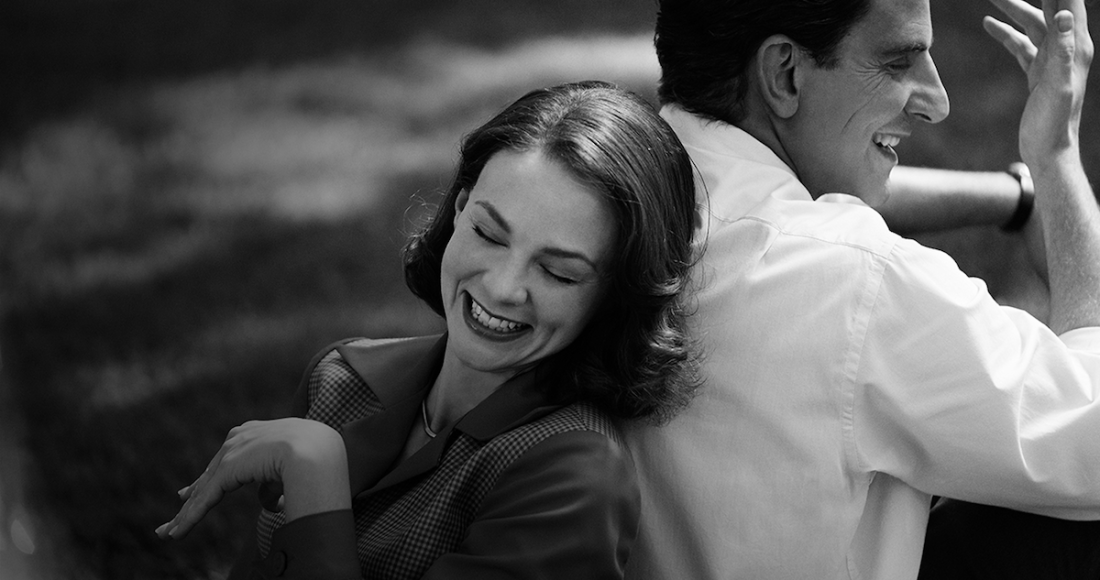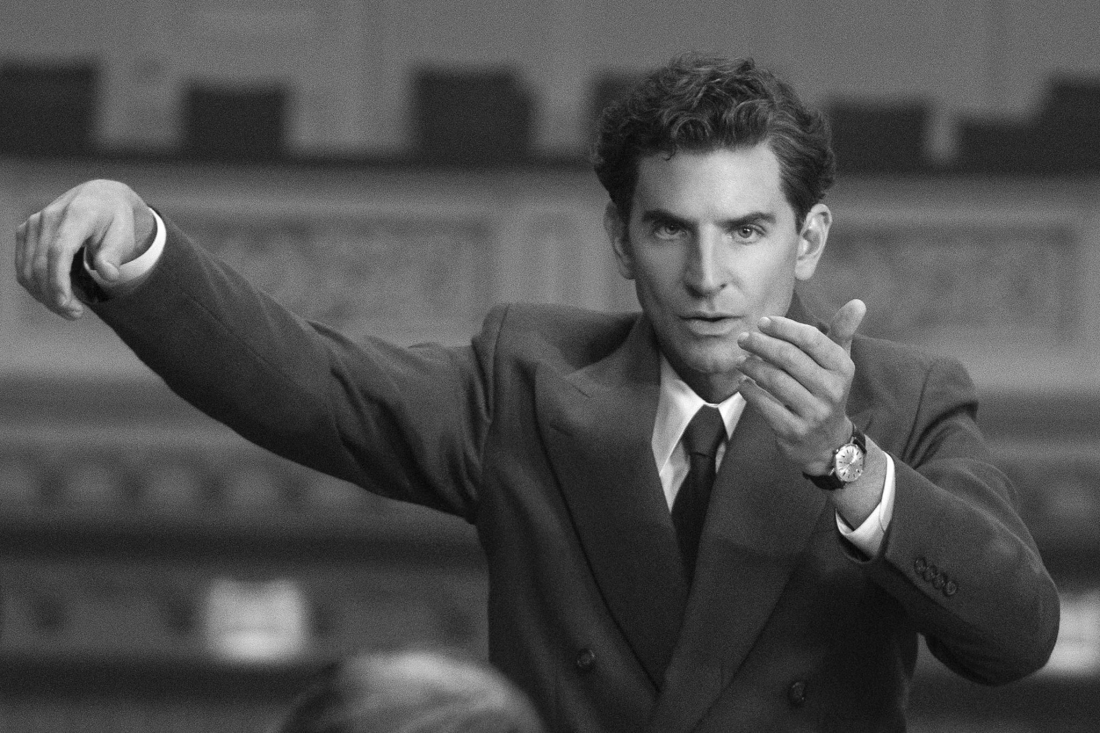Maestro (2023) is a biographical drama film from sophomore writer-director Bradley Cooper. Cooper also stars in the film as Leonard Bernstein, renowned Broadway composer, following his life and relationships, particularly with his wife Felicia (Carey Mulligan). The film debuted at the Venice Film Festival to strong reviews, and releases in theaters and on Netflix this December. Why has this generated so much Oscar buzz?

I’ve always been fairly neutral on Bradley Cooper as an actor. He’s given strong performances in the past, and I wouldn’t have been upset to see him win any of his past Oscar nominations, even if they weren’t my personal favorite performances of their respective years. That said, I was concerned when I heard this project announced, as it really reeked of desperation to win his first award and get that validation from his peers. But perhaps that was just Film Twitter infecting my brain – it’s also entirely possible that Cooper just wanted to tell this great man’s story, and this was a genuine passion project he made with honest intentions. After seeing the film for myself, I can conclude that neither theory was the correct reason why this film was made. It seems to me that this was borne out of Bradley Cooper’s desire to cosplay as Leonard Bernstein for two hours, which resulted in a thoroughly exhausting experience.
I’ve been guilty in the past of conflating “big” acting with “good” acting, considering that the former tends to get the most attention from the public. An actor who screams and cries and runs the gamut of extreme emotions is far more likely to draw notice than one who conveys subtler and more restrained emotions, but that does not mean that the former is any more difficult. In fact, the opposite is often the case, as I find myself drawn to actors who are able to do a lot with a little and show restraint rather than going over-the-top. Maestro very much takes the philosophy of “more is more”, always taking the showiest route when it comes to the central performances of Cooper and Mulligan. The extravagant Transatlantic accents, the hyper-emotive facial expressions, and of course the emotional ups and downs of their personal life make for an exercise in showing off what they are each capable of as actors.

There are moments when this works, and I don’t want to spend this whole review trashing the film because it’s not horrendous. When we see the highs of Bernstein’s career, Cooper’s performance is electrifying; that cathedral scene where he performs Mahler’s Resurrection Symphony is one of the best scenes of the year, as he loses himself in the music and the performance. Similarly, Carey Mulligan is great in the smaller moments watching from the wings, an unwitting bystander in Leonard’s life as he cavorts with men and women alike and pushes his career onward without her. Their strained marriage, as seen over the course of decades, leads to an interesting ongoing dynamic between the two leads that pushes them naturally to some extreme places, and that is where the film is at its best.
The problem is that the film maddeningly chooses to focus on the smallest moments of their lives, rather than the aspects of Bernstein’s career that made him famous. When he composes the hit Broadway musical West Side Story, we only hear about it in passing on the radio; similarly, when he gets his first big break to conduct the New York Philharmonic orchestra, we don’t get to actually see him in the act. As someone who doesn’t know a lot about Bernstein beyond the basics, I wish this film had done more to make me care about him. Furthermore, the film chooses the most mundane moments of their lives to focus on – or rather, the moments in which the actors can mine the most visible emotions out of. There is a frustrating scene towards the end in which they sit in a doctor’s office and learn that Felicia has breast cancer – a scene that is completely unnecessary and grinds the pacing to a halt, but gives Cooper and Mulligan the chance to sob and hold onto one another for dear life. That scene is the clearest example of this film’s issues in my mind.

One other positive I will point out is that this film is a huge step-up for Cooper as a director, as the visual style of the film is gorgeous. Matthew Libatique serves as DP for the film, and the cinematography is pretty grand, switching flawlessly between black-and-white and color photography to striking effect. In general, Cooper makes good use of his budget, as every scene looks immaculate and I never found myself bored in terms of what was being presented to me on-screen. That said, to me a good director is about much more than the look and sound of a film…it’s about conveying the appropriate tone in every scene. And that is where I feel a stronger hand is needed behind the camera, as Cooper could have used a third-party to tell him when to reign in the performances a bit. This absolutely feels like a movie directed by an actor, as he never misses an opportunity to give himself and Mulligan the freedom to over-emote.
That leads me to the big question: do I think Bradley Cooper and Carey Mulligan gave good or bad performances in the film? That’s a complicated answer. They certainly have moments were they shine, and it’s usually in the quieter moments where they aren’t trying to do too much. Cooper’s big moment in the cathedral is his crowning achievement, and will likely earn him the Oscar – if the film had just been a five-minute short encompassing just that scene, I would have enjoyed it quite a bit more. Carey Mulligan also has a great scene towards the end, after her cancer diagnosis, when she watches her kids goof around the house and silently tears up (in a direct rip-off of All That Jazz, but I’ll let it slide). Personally, I would be annoyed if either of them won for these performances, because the film is so clearly made in the service of the actors that it’s almost unfair to any other performances of the year. But I can’t say they were Razzie-worthy or anything of the sort, and if this is the film that allows Cooper and Mulligan to be known as Oscar winners, I won’t hold a grudge.

Conclusion
Maestro is an exercise in an actor-director saying, “Look at how great this acting is right now!!” for two hours, which didn’t make for a very satisfying viewing experience. I found myself wishing the film did more to explain the genius of Bernstein and celebrate his accomplishments, rather than take for granted that the audience already knows everything about him (which I certainly did not and still don’t). The performances of Cooper and Mulligan work sporadically, and the production values are very strong, so I wouldn’t say this film is a total disaster – just a small misfire. Check it out for yourself and see if you connect with the story better than I did!
VERDICT: C-
All image rights belong to Netflix.
Happy holidays! I’m currently away for Christmas vacation, but I’ll be looking to check out several other awards releases I missed before the end of the year, like The Color Purple, American Fiction, The Zone of Interest and more! See you soon for reviews of those and more ongoing awards season analysis.
-Austin Daniel
I agree with you
Hyperbole
And unwieldy I thought
The narrative should have been taut
And where was the music..?
A film indulgently made for the actor director
Could have done with a stronger editor and screenwriter team
I am not on social media
But would love to connect with you
Smita Kudva
Independent filmmaker
Mumbai
India
magicloomgirl@gmail.com
LikeLike